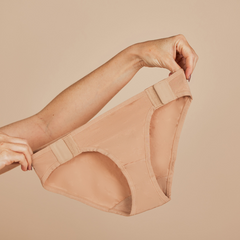
We had people submit their post-stroke questions to our Resident Sexual Health Clinician, Dr. Kathryn Ellis, OTR/L, OTD, AASECT-SC, an occupational therapist and American Association of Sexuality Educators, Counselors, and Therapists Certified Sexuality Counselor.
What to expect emotionally after a stroke?
A symptom of stroke can be a change in emotional processing. You may find that you're emotionally labile, confused, depressed, or experience elation or euphoria. All of these can be actual symptoms of the stroke.
A secondary symptom of strokes can also be depression. What I mean by secondary symptoms is that the stroke may not cause a neurological change impacting mental health issues, but the experience of having a stroke and managing the symptoms may lead to mental health issues. The post-stroke experience – the limited mobility, changes in sensation, changes in your daily routine, needing to go to rehab, canceling family vacations – can impact your emotions and mood. These are secondary things that can impact your emotional state and cause depression, anxiety, anger, apathy, or sadness.
Are personality changes after a stroke permanent?
Post-stroke some changes are permanent and some changes are temporary. Typically, the more severe symptoms occur closer to the stroke, and as time goes on, these symptoms can lessen or go away.
As such, sometimes changes to the personality can be permanent and sometimes they can reduce or go away throughout the recovery process. That’s for those primary symptoms. Again, when talking about secondary symptoms, such as depression, lack of joy, anxiety, a shorter fuse, and confusion, these are not necessarily permanent.
And even if the primary symptoms do not go away, you can learn to adapt and you can learn strategies and modifications that can make some of those secondary symptoms lessen. That would normally be done through working with rehabilitation specialists such as occupational therapists, speech therapists, and physical therapists.
Will a person ever be the same after a stroke?
This is a really difficult question to answer. As we've discussed, there are temporary and permanent changes that people experience after a stroke. There are also a lot of modifications and adaptations people can learn through working with rehabilitation professionals that can help people be independent and enjoy activities that they used to enjoy prior to the stroke.
A lot of times, partners of the people who had a stroke may need to go through a grieving process, particularly if their partner has significantly changed. There's a grieving process of who the person used to be. happens because it's such a rapid change and it can feel like there's been a loss. It’s important to acknowledge that those feelings are valid.
One helpful reframe to aid in the grieving process is to acknowledge that we are all constantly changing. We are never promised the same person forever at a given point in time, but in this case, it can be particularly difficult because it’s such a rapid change. That’s why it’s important to acknowledge that people change over time anyways, and that there's a fluidity to people.
Experiencing a stroke or supporting a loved one who has a stroke can feel overwhelming at times and create a lot of uncertainty about the future, however it doesn’t mean that you can’t do the things you enjoy doing. Working with rehabilitation professionals is important to trial-and-error the modifications, adaptations, adaptive apparel, assistive devices and equipment that work for you.




